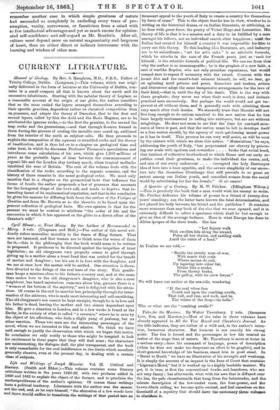Life and Writings of Joseph Rossini. Vol. IL Critical and
literary. (Smith and Elder.)—This volume contains some literary criticisms written in the years 1829-39, with two prefaces added in 1860 and 1862-to explain the object of the former, and to proclaim the unchangeableness of the author's opinions. Of coarse these writings have a political tendency. Literature with the author was the means, not e end, and, as he says himself, "the alteration of a few words here and there would suffice to transform the writings of that period into an
incessant appeal to the youth of Italy to create a country for themselves by force of arms." This is the object that he has in view, whether he is writing on the historical drama, or on Italian literature, or criticizing, as he does with great force, the poetry of Victor Hugo and Lamartine. His theory of life is that it is a mission and a duty to be fulfilled by a man amongst his fellows, not an individual search after happiness ; until the Italian had created for himself a country it was impossible for-him to carry out this theory. To this leading idea literature, art, and industry are to be subordinate ; "art for art's sake" is an atheistic formula, which he attacks in the case of the French poets, just as each for himself, is the atheistic formula of political life. We can see from this why the author is so unmanageable ; he is the prophet of a new faith, a sort of warlike Baptist, who not only preaches repentance, but would compel men to repent if necessary with the sword. Content with the locust diet and the camel's-hair raiment himself, he will, we fear, -go on agitating until princes and peers, financiers and traders, artists and litterateurs adopt the same inexpensive arrangements for the love of their kiud,—that is, until the day of his death. This is the way with these prophets; they never see when their work is done, and irritate practical men excessively. But perhaps the world would not get im- proved at all without them, and it generally ends with admiring them very much after their deaths. We sincerely trust that Mazzini will not live long enough to do serious mischief to the new nation that he has been largely instrumental in calling into existence, but are -not without misgivings. He does not seem to see that the' time for outward mea- sures of force is past, and that the nation must be left to develops itself as a free nation should, by the agency of such quickening moral .power as it has in itself. This process he can very well assist, as will be seen by the extract with which we close this notice. " Materialism," he says, addressing the youth of Italy, "has perpetuated our slavery by poison- ing our souls with egotism and cowardice . . . . broke that social bond, that instinct of collective brotherhood to which Rome and our early re- publics owed their greatness, to make the individual the centre, end, and aim of our every endeavour . . . . corrupted the holy Dantesque idea of love into a base appetite, and the severe simplicity of our ances- tors into the shameless libertinage that still prevails to so great an extent among our Italian youth, and cancelled -women from the social world by substituting for her the female." Si sic °nada:






























 Previous page
Previous page